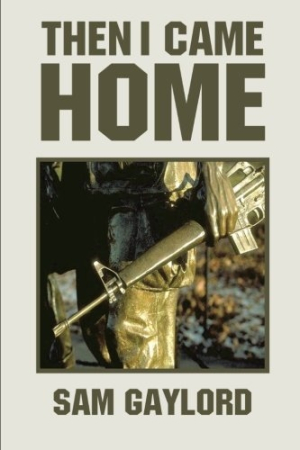Then I Came Home
A Vietnam veteran tells the hard story of how he turned fear into gratitude and anger into the motivation to help himself and others.
Sam Gaylord’s memoir, Then I Came Home, is a story of hard luck and redemption. Gaylord reflects on a childhood of poverty and abuse, followed by a horrific Vietnam War experience that left him disabled. He also says the US government did not stand behind its troops in that war and has not been listening to its combat veterans. This book is authentic and engaging.
Gaylord tells of growing up one of nine kids in a dirt-poor Irish/Indian family. His father, an itinerant farm laborer, moved them from one leaky-roofed shack to the next in rural southern Indiana along the Ohio River. He was “the most different kid in class,” in ragged clothes and botched haircuts administered by his mother. Not long after high school, he joined the Marines, where he saw an opportunity to serve his country and, later, use his veteran’s benefits to further his education. He arrived in Vietnam in time for the legendary battle of Hue, where he became “part of the insanity.” And Hue was only the beginning of his tour.
It was 0800 hours and we were told to saddle up. … I had my M-16 rifle, my helmet, flak jacket, plenty of ammo, hand grenades, 2 canteens of water, C-rations (food), new combat boots, bug spray and flares. I felt like John (fucking) Wayne.
The book’s cover, page layout, and bold type are as simple and direct as Gaylord’s writing style. Not one to strike a false note with a literary turn of phrase, he writes in a clear, plainspoken style, and his voice rings true. Grammar and punctuation are not always correct, nor is spelling, but these things rarely distract from Sam’s story or his message. His tone is often angry, and he spares almost no one, especially not the honchos in Washington who had “no clue” as to what American boys were experiencing in the “shit hole” in Southeast Asia. Perhaps contradictorily, he also rails at the “draft dodging chicken shits,” many of whom avoided the war just as Sam, who comes to realize the futility of this war, often wishes he had done. He reserves most of his compassion for his fellow grunts, especially disabled combat veterans like himself who, he argues, “deserve better.” But Sam doesn’t clearly convey how these vets are being wronged, or what should be done to improve their lives.
Covering his first twenty years, Gaylord is a reliable narrator, providing readers with relevant details. Back home in Indiana after his convalescence, he is an angry young amputee with an uncontrollable appetite for “Mister Beam and his Uncle Bud.” Eventually, he gets to the point where he does not want to live. In perhaps his best prose, Gaylord humbly tells of a spiritual breakthrough and a shift to a new, can-do outlook. “I had learned,” he writes, in a powerful litany of hard-earned lessons, “to use my anger to motivate myself in a positive way.”
Here his audience, many of whom will be veterans, some of them disabled, will benefit from dramatization. Seeds for his transformation can perhaps be planted early, and several defining moments of his “recovery” will satisfy readers as to how Gaylord turned fear into gratitude and anger into the motivation to help himself and others.
Reviewed by
Joe Taylor
Disclosure: This article is not an endorsement, but a review. The publisher of this book provided free copies of the book and paid a small fee to have their book reviewed by a professional reviewer. Foreword Reviews and Clarion Reviews make no guarantee that the publisher will receive a positive review. Foreword Magazine, Inc. is disclosing this in accordance with the Federal Trade Commission’s 16 CFR, Part 255.

